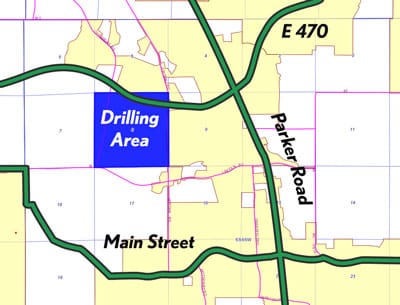Hydraulic fracturing “fracking”in Douglas County’s future?

by Elizabeth Wood West (Maps provided by COGCC)
People in Douglas County are buzzing about fracking. What is fracking? Hydraulic fracturing (fracking) is 60-year old process used to extract oil and gas from underground shale formations. Millions of gallons of water (90%), sand (9%) and trace chemicals (1%) are pumped into deep shale formations at pressures of 9,000 pounds per square inch or more. The fluid cracks the shale and/or widens existing cracks, freeing hydrocarbons to flow toward an underground well.
According to Douglas County’s Assistant Director of Planning Services Steve Koster, Chesapeake Energy filed for and received approval for a drilling/spacing order on August 8 from the Colorado Oil and Gas Conservation Commission (COGCC) for a section of land (one square mile or 640 acres) in the Stonegate Village subdivision, located east of I-25 on Lincoln Avenue in Parker. Chesapeake Energy, an Oklahoma City-based company, and CNOOC Limited, China’s largest offshore energy producer, are partnering for oil and gas drilling in a huge shale formation known as the Niobrara Shale project. Niobrara covers 8,400 square miles in Colorado and Wyoming.
Koster stated that a drilling/spacing order does not permit Chesapeake to drill, but sets up the parameters within which Chesapeake could file for a permit to drill within that one square mile. Koster said it was his understanding COGCC has also approved drilling/spacing orders on approximately two dozen sections of land in Elbert County. No drilling permits have been issued in Douglas County to date nor is there any timeline for when this could occur.
Town of Castle Rock Planner Sandy Vossler recently conducted a public meeting and discussed oil/gas drilling, fracking, and potential impacts including water contamination, burn-off, odor, noise, and dust. Vossler explained that the Niobrara formation is approximately 7,000 feet below the surface and below the Denver Basin’s underlying aquifers – the primary water source for thousands of County residents. Vossler said the town is aware of an inquiry from an oil/gas company and a mineral rights owner regarding a property that is an undeveloped commercial/industrial-zoned property on Front Street in Castle Rock, and another inquiry regarding a county property adjacent to the town’s boundary southwest of Wolfensberger and Plum Creek Parkway.
With the environmental benefits of fracking also comes the risk of potential water contamination, a concern shared by some county water providers and citizens alike. Chesapeake Energy was fined $1 million dollars in May by Pennsylvania officials for contaminating the water supplies of 16 families in Bradford County. The company had not properly cemented its boreholes, so gas migrated up along the outside of the well, between the rock and steel casing into aquifers.
What about the water?
Some experts suggest it can take up to seven million gallons of water to frack a single well, and at least 30 percent of that water is lost forever by being trapped deep within the shale. It is likely that water for fracking would be purchased from local water providers. Used fracking water is generally stored in a lined wastewater pond for treatment or recycling.
Douglas County’s local government designee for the COGCC, Curt Weitkunat, said that COGCC regulates oil and gas activities and has rules regarding water contamination. The county and town recently drafted land and surface regulations in an effort to exercise some measure of oversight if and when drilling occurs.
Geoff Withers, district one director for the Rural Water Authority of Douglas County, said “The only role we can play is that we have registered with COGCC as a local government and will be notified if permits are issued within our service area,” said Withers. He recommended that well owners and water providers begin immediate water testing and conduct ongoing monitoring to track potential contamination.
For further information, contact the Colorado Oil and Gas Conservation Commission at www.cogcc.state.co.us.